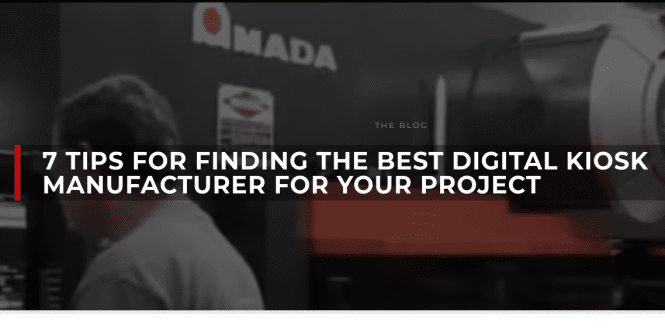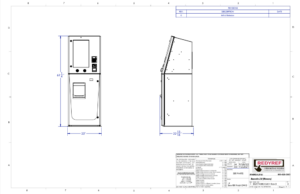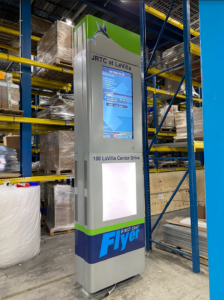
Last Updated on December 30, 2025 by Staff Writer
How to Pick a Kiosk Manufacturer
The question often asked is “What type of hardware do I need? Freestanding, wall-mounted, countertop, outdoor vs indoor, touchscreen size, printer/scanner, payment terminal — these all matter.”. Here are some answers for you
From RedyRef — Excellent breakout of what to consider when you are picking a partner for your kiosks. Ordering a POS terminal is much easier and straightforward. Engaging with a kiosk company means due diligence and experience. Having someone practice on you because they are cheap isn’t going to work.
Long term projects mean multiple iterations. The initial iteration of the AT&T Bill Payment kiosk was one thing. It has since had many interactions and changes. Service and support goes from one year to two to five to 10 all of the sudden. Hardware and software. Software is always underestimated generally because software engineers like to be optimistic. Hardware engineers tend to be very precise. In my experience.
Summary
Nice article that provides guidance on picking a kiosk manufacturer. Here are the key points:
- Determine Your Needs: Identify the type of kiosk, features, and budget.
- Research Manufacturers: Look for companies with experience and a good reputation in your industry.
- Customization Capabilities: Choose a manufacturer that can tailor the kiosk to your specific requirements.
- Technical Expertise: Ensure the manufacturer has skilled engineers and designers.
- Quality Control: Select a manufacturer with rigorous testing and quality assurance processes.
- Integration and Compatibility: Ensure the kiosk can integrate with your existing systems.
- Ongoing Support and Maintenance: Opt for a manufacturer that offers comprehensive technical support and maintenance services.
Article
1. Determine Your Digital Kiosk Needs
Before you start looking for a self-service kiosk manufacturer, you need to determine your specific needs. What type of digital kiosk do you need? What features are important to you? What is your budget? These are all important questions to ask yourself before you start starting the research process.
2. Research Kiosk Manufacturers, Considering Their Experience and Reputation
When searching for a kiosk manufacturer, it’s crucial to find a company that fits your needs. Look for those that have experience in your industry and offer the type of digital kiosk you need. To evaluate a manufacturer’s reputation, read online reviews and ask for references.
REDYREF is an industry leader in kiosk manufacturing, with a 100-year history of delivering high-quality self-service kiosks and exceptional customer service. With experience working in various sectors, including hospitality, retail, healthcare, and government, they have a proven track record of providing customized solutions that meet the specific needs of each industry and business.
3. Evaluate the Manufacturer’s Customization Capabilities
Look for a company that can collaborate with you to design and build a digital kiosk that fulfills your specific requirements, whether that involves integrating with existing systems, incorporating your branding, or adding particular hardware or software. To ensure your kiosk is an ideal match for your business, consider a manufacturer that also offers a full range of customization options, whether it’s the size, color, software, integrations, or type of display used.
REDYREF stands out among interactive kiosk manufacturers by providing customizable kiosk solutions that are tailored to meet the specific needs of your business. They offer flexibility in hardware and software options and a range of kiosk styles and designs to choose from. Additionally, they work closely with clients to ensure that the kiosk solutions they provide are customized to the specific requirements of their business. REDYREF also offers various customization options, including branding, software integration, and hardware features, to deliver kiosks that are unique to each client.

4. Consider the Manufacturer’s Technical Expertise
Self-service kiosks can be complex systems that require a high level of technical expertise to design and build. Look for a manufacturer that has a team of experienced engineers and industrial designers who can handle the technical aspects of creating a kiosk, including hardware design, software development, and integration with other systems.
5. Assess the Manufacturer’s Quality Control Processes
Ensuring the quality and reliability of your interactive kiosk is vital to meet your expectations and minimize downtime and maintenance costs. To achieve this, choose a manufacturer that has a comprehensive quality control system in place to test and inspect every kiosk before shipping.
Investing in a self-service kiosk is a significant decision, so choose a manufacturer that produces high-quality and durable kiosks. Look for a manufacturer that uses top-quality materials in their construction process and has thorough testing and quality control measures. Also, confirm that the manufacturer offers warranties and ongoing support to maximize the lifespan of your investment.
REDYREF uses top-quality materials in its construction process and conducts rigorous testing and quality control measures to guarantee the longevity of your investment. Moreover, they provide warranties and ongoing support to ensure your kiosks operate smoothly. Their quality control system ensures that each kiosk is built to the highest standards and meets the specific needs of clients in various industries.
6. Ensure Integration and Compatibility With Current Systems
When selecting a self-service kiosk, it’s important to ensure that it can integrate seamlessly with your existing technology and software systems. A reliable manufacturer should be able to provide integration solutions and guarantee compatibility with your hardware and software. It’s also essential to choose a manufacturer that offers ongoing maintenance and support for your kiosks. REDYREF offers integration solutions to ensure compatibility with your existing technology and software systems.

7. Look for a Manufacturer that Offers Ongoing Support and Maintenance
It’s essential to have ongoing support and maintenance options available for your digital kiosk, even when it’s well-designed and built. Choose a manufacturer that offers comprehensive technical support, including remote monitoring, kiosk software updates, and on-site repairs, to ensure your kiosk remains functional and reliable. Look for a company that has a rigorous quality control process and uses top-quality materials and testing procedures to deliver reliable and durable kiosks. REDYREF offers comprehensive technical support and maintenance services, providing timely and responsive support, as well as proactive maintenance services to minimize downtime and maximize uptime.
Why REDYREF for Digital Kiosk Manufacturing?
Selecting the right self-service kiosk manufacturer is crucial for your business’s success. It’s important to consider factors like experience, customization abilities, quality control, technical support, and cost to choose a manufacturer that can meet your specific requirements. REDYREF is an excellent choice for businesses of all types due to its custom solutions, thorough quality control, complete technical support, competitive pricing, and extensive industry experience, and you can trust that your self-service kiosk project will be a success. Contact us today to learn more about how their team can help bring your vision to life.
Related picking a kiosk manufacturer Links
- REDYREF Kiosks – Kiosk Manufacturer
- RedyRef Kiosks Adds Software Capability via Acquisition
- Ticketing Kiosks by REDYREF
- Miles Davis Seven Steps to Heaven
Meanwhile — Nice list from Sixteen Nine on Picking a Digital Signage CMS
Digital Signage Software Selection: A Practical Guide
Digital signage software selection is a critical decision for any organization implementing display solutions. This guide outlines key considerations across ten essential areas that influence successful deployment and operation.
Key Decision Points
1. Operating System: Choose between SoC (System on Chip) displays and separate media players. SoC offers cost efficiency but less flexibility, while media players provide more power and adaptability.
2. Licenses & Pricing: Modern solutions typically use subscription models starting around €20/month per endpoint. Additional costs apply for enhanced features like remote management and specialized content.
3. Sourcing Strategy: Options include working with integrators, purchasing directly from providers, or going through distributors. Beginners benefit from integrator partnerships, while larger operations may prefer direct relationships.
4. Architecture: Modern systems utilize cloud-based CMS with API integration capabilities. Key features include playlist management and real-time data processing.
5. Cybersecurity: Essential considerations include protection against unauthorized access, compliance with regulations like the EU Cyber Resilience Act, and regular security updates.
6. Usability: Systems should accommodate various user types without requiring technical expertise, offering intuitive content creation tools and role-based access control.
7. AI Integration: Emerging capabilities include automated translation, content adaptation, error detection, and playlist optimization.
8. Industry-Specific Solutions: Different sectors require specialized features – from restaurant menu displays to transit information systems. Solutions range from modular add-ons to dedicated industry platforms.
9. Sustainability: Efficient operation through remote management, automated power controls, and intelligent brightness adjustment reduces energy consumption and extends hardware life.
10. Revenue Generation: Opportunities exist for monetization through third-party advertising, with systems supporting automated ad slot sales and performance reporting.
Organizations should evaluate these factors against their specific requirements, considering both immediate needs and future scalability.
I can’t really argue with any of these, but here’s what I would add and what I would downplay.
Add: Business health of the software vendor, as in financials and client base. A LOT of companies are just getting by and would happily entertain a “liquidity event” and some of them have one whale client that represents a disproportionate amount of revenue. That client moves on and the company is pretty much sunk. So that question needs to get ask. As in “Make us comfortable and confident your company has the financials and backing to carry out the 3-5 year term of any agreement we reach.”
Downplay: There are all kinds of public and private information display networks that will never, and never should, have advertising on them, so revenue generation should be key when ads are a possibility. It’s OK to have a network of digital signs that just inform and guide people.
More Kiosk Hardware Needed Tips
- Kiosk Best Practice – Picking a Provider
- Hotel California – One of Three July Top Picks for Kio
- Primer – Picking Self-Service Kiosk Manufacturer



